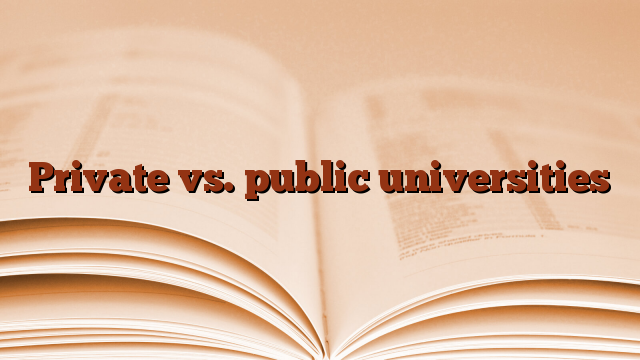When choosing a college, you may have come across private colleges and public colleges. Many people didn’t even know that there were private and public colleges or what the difference between them was. We’re going to look at the two different types of institutions so you can decide which one is best for you.
The first thing to look at is what exactly is a private college. A private college or university is an independent school that is generally privately funded and has its own rules, guidelines, and goals. Most private schools are also affiliated to other religious communities or are gender-specific. Private institutions can only have one field of study, such as only humanities or humanities, or offer a wide range of courses.
On the other hand, public colleges and universities are usually funded by public funds such as the national government or the state government. Public institutions too have to adhere to rules, guidelines and goals that have already been decided by the state or the government. Of course, there is no discrimination against who can apply to public schools unless they don’t meet the academic standards set by the school’s admissions office. These institutions generally have more than one major such as liberal arts, criminal justice, and education.
When it comes to class size, there can be a marked difference between public and private colleges. This is generally a personal preference, but it should be considered. The average number of students attending a private college is usually in the thousands, between 1,000 and 5,000 students at a time. This makes their class size quite small and allows them to have a smaller teacher-student ratio. Some public schools allow at least 45,000 students to be enrolled at the same time. Depending on the class, the larger classes usually have around 200 students to a professor at a public university.
Another thing that can make a huge difference in choosing a type of college is the tuition fees. Of course, teaching has many variables aside from being public or private, but there are some general assumptions that can be made. In general, private schools cost more than public schools. Also for students who want to enroll in a state school; They can expect their tuition fees to be partially discounted compared to those who enroll outside of the state. Private tuition fees usually don’t have a discount, even if you’re in the state.
There are pros and cons to every type of institution, but ultimately it comes down to what you want to pay for, what you want to learn, and how you want to learn. If you have more hands-on experience or can relate to your teacher but you don’t mind spending a little extra, you may want to enroll in a private college. Maybe you want to have more interaction with the students and can’t afford to pay more then a public college might be best for you. Another option that everyone has is to attend an online college. Online colleges and courses can be very affordable, but they can still make you feel like they’re small classes with more student-teacher interactions.

Leave a Reply